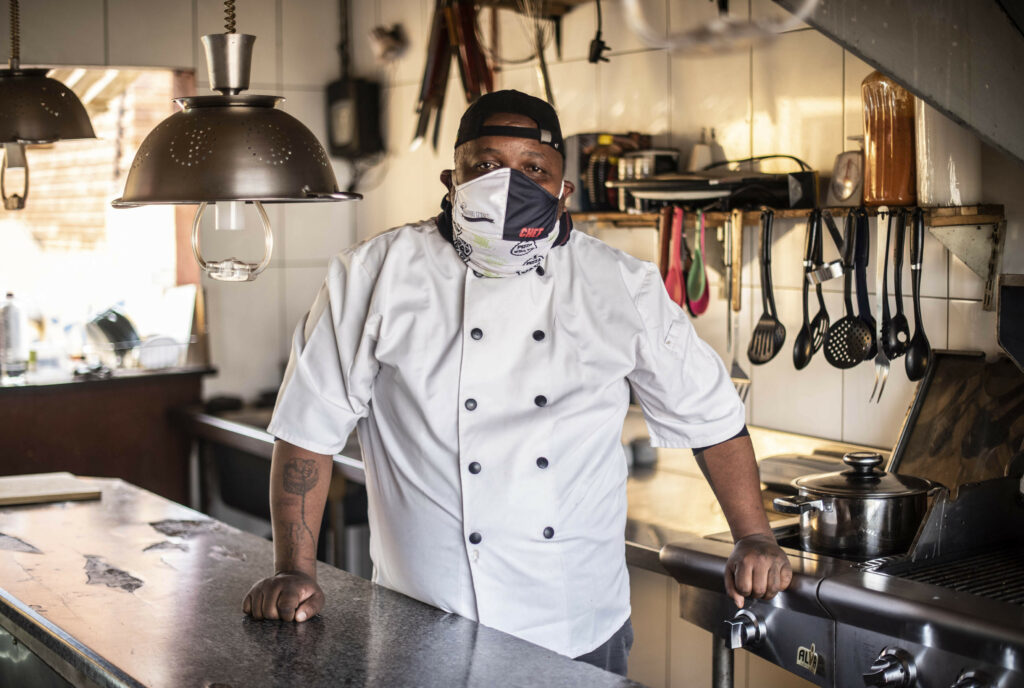Scraps: Masechaba Nonyane (left) and Lebo Kgoadi of Native Rebels need their businesses to recover from the pandemic. (Photo: Paul Botes/M&G)
Native Rebels, on Kadebe Street in Jabavu, Soweto, did not open its doors when restaurant walk-ins were allowed under lockdown level 3.
The restaurant is on the second floor and the street below is a hive of activity; pedestrians walk by and taxi drivers hoot and call for passengers.
Owners Masechaba Nonyane and Lebo Kgoadi say they did not open their restaurant because it would be too costly to meet the safety standards required under the lockdown regulations.
After two months of not operating during levels 5 and 4 of the lockdown, they do not have money for the additional expenses.
“It’s actually cheaper to be closed at this point because the overheads of opening up are far too high; because you’ve got rent, you have employees, you have safety precautions you need to take, so it’s quite expensive to open,” says Nonyane.
Another reason for not opening during level 3 is that they want to protect the lives of their employees, who commute to the restaurant.
They decided to allow two who live in the area to assist with UberEats orders, collections and takeaways. The others 13 are at home and get money from the Unemployment Insurance Fund.
Nonyane says that in the past month of running the business online they have only just been breaking even.
Despite this, Kgoadi says they plan to expand the business by creating a working section for entrepreneurs and an art gallery.
“The bulk of people come to a restaurant for alcohol, so we need to find other reasons to make people come back here,” he says.
The sale of alcohol was banned, then unbanned for a short while, before being banned again.
The restaurant industry has been hard hit by the strict lockdown regulation imposed by the government under the national state of disaster. Restaurants were not allowed to open when the March 26 lockdown started.
It was only in May, when the regulations were eased and cooked meals could be delivered, that they could operate again.
Later in June, pick-up takeaways were allowed, along with the delivery of alcohol. On June 17, President Cyril Ramaphosa said restaurants could provide sit-down meals.
Then on Sunday, Ramaphosa announced the restriction of alcohol sales once more.
Nonyane says alcohol sales make up 60% of their overall sales.
But she feels the business has a responsibility to protect their customers. “We have to also uphold those principles because we plan to be here for the longest time. All I can do is to comply and we are reliant on the people of Soweto just for support.”
Nonyane says she can see that people’s pockets are emptying because they’ve been retrenched.
Pointing out at the surrounding area, she says: “You can even see now these streets of Soweto are much busier than normal. Generally people are at work and it only gets busy in the afternoon when people are coming back.
“The only thing that I do feel pain about is that our government was not ready for anything. Two months was not enough to prepare for this pandemic, I think it needed 24 years. They failed, I believe.”
She says a lot of restaurant businesses are closing their doors.
But she believes this is a time for people to come together and collaborate on how ways to keep businesses going in a safe way.
Khabo Gcina’s Lifestyle Restaurant is on Teke Street in Leboeng, Tembisa. Sibisi Gcina is in the kitchen when the interview begins. He releases a spray that is supposed to kill viruses in the air, saying that he is afraid of contracting Covid-19.
 Khabo Gcina of Khabo Gcina’s Lifestyle Restaurant. (Photo: Paul Botes/M&G)
Khabo Gcina of Khabo Gcina’s Lifestyle Restaurant. (Photo: Paul Botes/M&G)
“This Covid-19 is airborne now. Hence the gate is closed.”
The World Health Organisation recently said there have been reports suggesting there may be airborne transmission in medical settings of the coronavirus, but “much more research is needed”.
Gcina adds: “I cannot even let people in; I am freaked out; I am not comfortable.”
His restaurant specialises in fine cuisine. After travelling around the world as a chef, Gcina came home and converted his late mother’s house into a family friendly restaurant.
The rooms, which have beautiful paintings, cater for groups of people.
“The first 21 days [of the lockdown]were hell.” He had to give away food, which was like giving away money meant for the business.
The restrictions on the sale of alcohol do not affect him much because he only served wine “now and then”.
He says his restaurant mostly depends on bookings and those have declined dramatically.
Previously, on a Sunday, his busiest day, he would get 100 people. Now it’s a busy day if he gets four customers. “Right now we are the Davids
and we are fighting the Goliath,” he says. “I am trying to get into making takeaways. I need to be one of the people that will survive and start again.”
Tshegofatso Mathe is an Adamela Trust business reporter at the Mail & Guardian